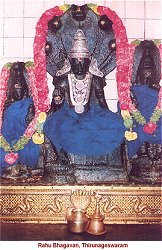|
|
|
RAHU BHAGAVAN

Thirunageswaram Sthala varalaru, dosham and remedial measures
The king of the nagas, Rahu prayed to Lord Siva and hence this place got the name Thirunageswaram. Here Rahu Bhagavan has manifested with both his consorts. At this sthala, the colour of milk changes from white to blue during Abhishekam. On 16.2.86, a snake had shed off its outer skin on Rahu Bhagavan, which is preserved and worshipped to date.
The abode of Uppiliappan, which is also hailed as 'South Tirupathi', is situated very close to this temple. Of the 127 temples located to the South of river Cauvery, this temple is amongst the most prominent.
Suryan, Vinayagar, Gautamar, Nalan, Parasarar, Pandavas, Vasishtar, Indran, Brahma, Bageerathan, Chandrasenan, Adiseshan, Kakkan Karkodagan, Sounagar, Nargunan have prayed and benefited at this sthala.
King Sambumali who had incurred the wrath of sage Kaalangiri, attained moksha after bathing in the temple tank and praying to the Lord and Ambal of this temple.
When amirtham emerged after
churning of the Paarkadal by the devas and the asuras, Lord
Vishnu in the guise of Mohini was distributing the amirtham only
to the devas. Realising this, Rahu (an asura) with the help of
Sukrachariyar, took the form of a deva and consumed the nectar.
Suryan and Chandran who noticed this, complained to Lord
Narayana. In anger, Lord Narayana hit Rahu on the head with the
spoon in his hand. The head was cut off and fell on the ground.
But because he had consumed amirtham, his head and body continued
to live. The body of the snake got attached to the head. Rahu
takes his revenge on Suryan and Chandran, whenever he gets a
chance by devouring them. This is commonly called as eclipse.
Rahu prayed to Lord Vishnu (Narayana) and got the position of a
Sayagraham.
| Rahu is the source of
plenty. Kalathra dosham, puthira dosham, communicable
diseases, mental disorders, leprosy, fall in grace are
caused by Rahu dosham. Praying to Rahu at this sthala
helps rid a person from these factors and also saves the
person from all poisonous life forms. Trips to holy
places, Gnanmarkam are his beneficial aspects.
The sthalam of Rahu is Thirunageswaram, which is located 6 kms from Kumbakonam, enroute to Karaikal. The presiding deities are Naaganaadar and Girigujaambigai. He faces the South-West direction. The Adi Devatha is Durga and the Prathyathi Devatha is the snake. His colour is black, his vahana is blue lion; the grain associated with him is orid; the flower-mandarai; fabric-black cloth; gem- Komedagam; food-rice mixed with orid dhal powder. |
RAHU
smarAmy aham sadA rAhuM sUryacandravIkSyaM vikRtadeham
surAsuraM rogaharaM sarpAdibhItiharaM shurpAsanasukhakaraM shUlAyaudhadharakaraM
karAlavadanaM kaThinaM kayAnArNakaruNArdrApahNgaM caturbhujaM khaDgakheTAdidharaNan carmAdinIlavastraM gomedakAbharaNaM shanisukramitraguruguhasaMtoSakaraNaM
I am constantly reminded of Rahu who seizes Surya and Chandra[1], and is deformed[2].
Who is both God and demon[3], who removes all ills, and dispels danger from poisonous creatures like serpents. Who does good to those who worship him seated in his grain-sieve[4] and bears the spear.
Who with a dreadful face, harsh, directing his compassionate side-glance when worshipped with the Kayana mantra[5], with four hands and carrying the sword and shield. Who is attired in blue cloth and dress made of leather, who wears ornaments made of Gomedaka gems[6], the friendly planet of Shani and Shukra, and who delights Guruguha.
Notes:
Propitiation of Rahu (Saturday)
CHARITY: Donate a coconut, old coins or coal to a leper on Saturday.
FASTING: On the first Saturday of the waxing moon, especially during major or minor Rahu periods.
MANTRA: To be chanted on Saturday, two hours after sunset, especially during major or minor Rahu periods:
Rahva-astottara-shata-nama-vali
(The 108 names of Rahu)
Aum rahave namah
Aum saumhikeyaya namah
Aum vidhuntudaya namah
Aum surashatrave namah
Aum tamase namah
Aum phanine namah
Aum gargyaynapa namah
Aum surapye namah
Aum nibajimutasamkashaya namah
Aum caturbhujava namah
Aum khangakhetaka-dharine namah
Aum varadayakahastakaya namah
Aum shulayudhaya namah
Aum megha-varnaya namah
Aum krishna-dhvajapatakavate namah
Aum dakshinashamukharathaya namah
Aum tikshnadamshtakarallakaya namah
Aum shupokarasansthaya namah
Aum gomedha-bharana-priyaya namah
Aum mashapriyaya namah
Aum kashyaparshinandanaya namah
Aum bhujageshvaraya namah
Aum ulkapatayitre namah
Aum shuline namah
Aum nidhipaya namah
Aum krishna-sarpa-raje namah
Aum vishajvalavrita ' asyaya addhashariraya namah
Aum shatravapradaya namah
Aum ravindubhikaraya namah
Aum chaya-svarupine namah
Aum kathinangakaya namah
Aum dvishacchatracchedakaya namah
Aum karallasyaya namah
Aum bhayamkaraya namah
Aum krura-karmane namah
Aum tamo-rupaya namah
Aum shyam-atmane namah
Aum nila-lohitaya namah
Aum kiritine namah
Aum nilavasanaya namah
Aum sanisamntavartmagaya namah
Aum candala-varnaya namah
Aum ashvyriksa-bhavaya namah
Aum mesha-bhavaya namah
Aum shanivat-phaladaya namah
Aum shuraya namah
Aum apasavyagataye namah
Aum uparagakagaya namah
Aum soma-surya-cchavivimardakaya namah
Aum nila-pushpa-viharaya namah
Aum graha-shreshthaya namah
Aum ashtama-grahaya namah
Aum kabamdhamatradehaya namah
Aum yatudhanakulodbhavaya namah
Aum govinda-vara-patraya namah
Aum deva-jati-pravishtakaya namah
Aum kruraya namah Aum gharaya namah
Aum shanir-mitraya namah
Aum shukra-mitraya namah
Aum agocaraya namah
Aum mani ganga-snanadatre' namah
Aum svagrihe' pravaladhyadaya namah
Aum sad-grihe'anyabaladhrite' namah
Aum caturthe matri-nashakaya namah
Aum candrayukte candalajati sihmajanmane rajyadatre namah
Aum mahakayaya namah
Aum janma-kartre' namah
Aum vidhuripave' namah
Aum madakajnanadaya namah
Aum janmakanyarajyadatre' namah
Aum janmahanidaya namah
Aum navame pitrihantre' namah
Aum pancame' shokadayakaya namah
Aum dhyune' kalatrahantre' namah
Aum saptame kalahapradaya namah
Aum shashthe' vittadatre' namah
Aum caturthe' vairadayaka namah
Aum navame' papadatre' namah
Aum dashame shokadayakaya namah
Aum adau yashah pradatre' namah
Aum ante vairapradayakaya namah
Aum kalatmane' namah
Aum gocaracaraya namah
Aum ghane' kakutpradaya namah
Aum pancame' ghishanashringadaya namah
Aum svarbhanave' namah
Aum baline' namah
Aum maha-saukhya-pradayine' namah
Aum chandra-vairine namah
Aum shashvataya namah
Aum surashatrave' namah
Aum papagrahaya namah
Aum shambhavaya namah
Aum pujyakaya namah
Aum patirapuranaya namah
Aum paithinasakulodbhavaya bhakta-rakshaya namah
Aum rahu-murtaye' namah
Aum sarva-bhishta-phala-pradaya namah
Aum dirghaya namah
Aum krishnaya namah
Aum atanave' namah
Aum vishnu-netraraye' namah
Aum devaya namah Aum danavaya namah.
Rahu seed mantra: Aum bhram bhrim bhraum sah rahave namah.
RESULT: The planetary diety Rahu is propitiated granting victory over enemies, favour from the King or government, and reduction in diseases caused by Rahu.

PLS SEND YOUR COMMENTS AND SUGGESTIONS TO
sunithbabu@yahoo.com